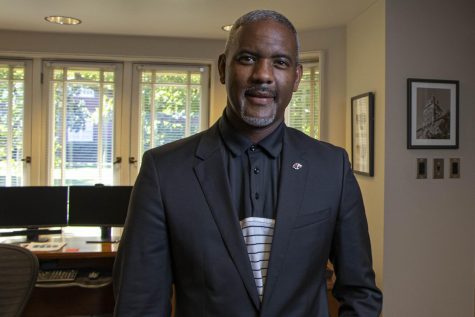SIU law professors weigh in on current constitutional challenges
On Sept. 17 five law professors at Southern Illinois University at Carbondale (SIU-C) convened in a panel to discuss their opinions on recent constitutional arguments on topics including reproductive rights and the extent of Fourth Amendment protections.
The panel was scheduled in honor of Constitution Day, the anniversary of the signing of the Constitution in 1787, and was broadcast for public view on the SIU-C Chancellor’s YouTube channel. Members of the panel were chosen by the students of five different law classes that also chose five cases pertaining to current social issues, including those being ruled on by the Supreme Court in its coming session, which begins Oct. 4..
Camille Davidson, dean of the SIU-C school of law, presented the case of Dobbs v. Jackson Women’s Health.
Advertisement
Davidson said the case was first filed in 2018 in Mississippi immediately following the passage of the state’s Gestational Age Act, which outlawed abortions after 15 weeks of pregnancy with no exceptions for rape or incest.
“This fall, the court will consider whether all pre-viability prohibitions on elective abortion are unconstitutional,” Davidson said. “This is the first time the court will rule on pre-viability since Roe [v. Wade].”
Viability in this case refers to the point of gestation in which a fetus has the ability to live outside of its mother.
Davidson said the Mississippi case comes at the same time as the recent bill from Texas which ruled all who receive abortions in the state after the development of fetal cardiac activity, occurring at approximately six weeks, and all who aid or abet in the act, are liable in private courts for $10,000 and attorney’s fees. She said both the Gestational Age Act and the Texas bill are seen as challenges to the Supreme Court’s decision in Roe v. Wade.
“This will affect people who do not have the means to travel to the jurisdictions where this procedure is available,” Davidson said. “Of course this overwhelmingly affects poor people and people of color.”
Davidson said the question of viability is one that clouds the conversation surrounding abortion. She said general consensus around the age of viability at the time of Roe was approximately 28 weeks and has since been reduced to 20 weeks.
“I think when we start to look at what things might look like in the future, I think we may scale back on the hard lines,” Davidson said. “I think we’ll see some restrictions that may mirror what some polls suggest, they say 75% of the population believe in some form of reproductive access to abortion.”
Advertisement*
Davidson said the difficult part will come from the state-to-state implementation of such a right. She said Mississippi already has some of the most restrictive abortion laws in the country, requiring at least two in-person clinic visits and a minimum 24 hour waiting period on procedures, as well as state mandated bias counseling before the procedure can be performed.
“So the pre-viability regulations can pass constitutional muster, if they don’t pose an undue burden, which of course requires the weighing of the state interest to the woman’s elective right,” Davidson said. “But if it is a ban, previability bans are unconstitutional, regardless of the state’s interest.”
Benjamin Bricker, as associate professor of political science at SIU-C, spoke on the case of Caniglia v. Strom.
Bricker said the events in question began when Edward Caniglia of Rhode Island presented his wife with a handgun and told his wife to kill him. Bricker said she refused, left to stay the night in a hotel and called the police to perform a wellness check on him. When the police arrived, Caniglia was sitting on his porch and accepted a mental health check on the grounds that his personal firearms will not be seized while he is gone.
Bricker said when Caniglia was taken in an ambulance, the police entered his home and seized his firearms while claiming they were acting within the bounds of the Fourth Amendment, which protects against unreasonable search and seizure.
Bricker said they believed police were working within the jurisdiction of their jobs under the “community caretaking exception” established in the Cady v. Dombrowski case of 1973. This exception allows police to perform unwarranted searches of vehicles if they believe the vehicle contains a threat to the community, but this protection, as ruled in Caniglia, does not include searches of the home.
“The Circuit Court and the District Court ruled in favor of the police,” Bricker said. “But the Supreme Court, actually with little evidence, unanimously overturned the ruling.”
Bricker said this ruling affects the police by preventing officers from being able to enter a home or even open the door to a home without potentially violating the Fourth Amendment. He said this applies in the event of a welfare check or during a mental health episode.
“This ruling makes it tougher for the police to do some of their non-explicitly crime fighting job,” Bricker said. “The case is really important because it’s the opening to hopefully what will be a new round of cases that deal with a new round of potentially immediate circumstances, or to potentially expand that community caretaking assumption.”
Bricker said the ruling will also make it more difficult for police to enforce laws put in place to permit the removal of firearms from an individual if they can be reasonably shown to be a danger to themselves or others. These are known as red flag laws.
“In this case, it’s not without reason for officers to believe that he might harm himself or others,” Bricker said. “It’s not completely unreasonable that they would want to go inside his home, but the Court is strongly saying that, without a warrant, you cannot enter the home in these circumstances.”
Bricker said when a red flag law is triggered, the permission that is received to confiscate a firearm is not technically considered a warrant. He said this means police would be precluded from entering a home to exercise these laws, despite having received legal permission to do so. He said this presents a clear challenge to the constitutionality of red flag laws and expects to see additional challenges in the future under the current court.
The other topics discussed by the panel included immigration rights, Second Amendment protections, and sexual orientation and gender identity rights. The full panel discussion is available for public viewing on the SIU Chancellor Youtube page.
Staff reporter William Box can be reached at [email protected] or on Twitter at @William17455137. To stay up to date with all your southern Illinois news, follow the Daily Egyptian on Facebook and Twitter.
Advertisement














